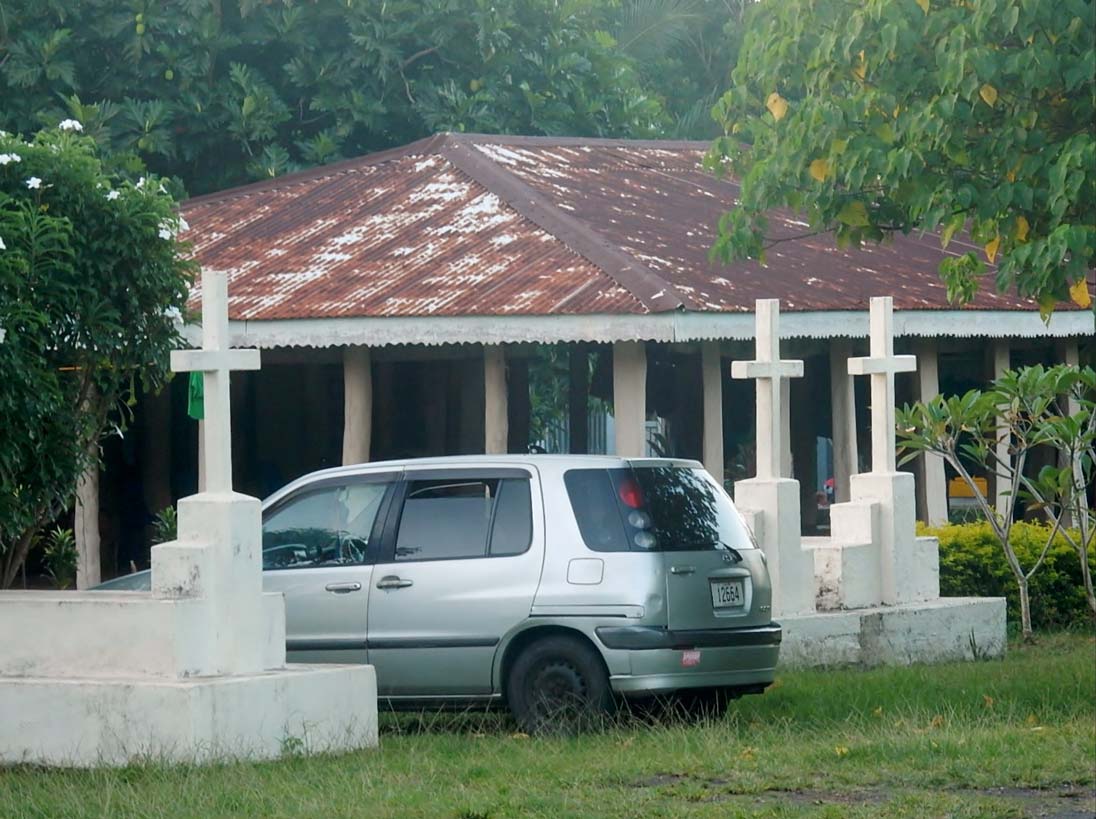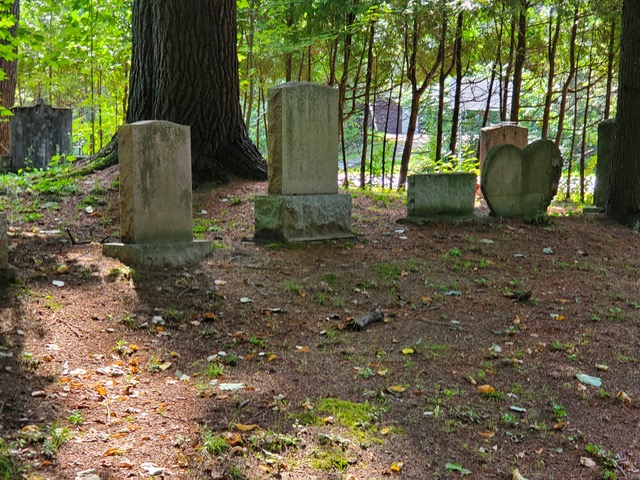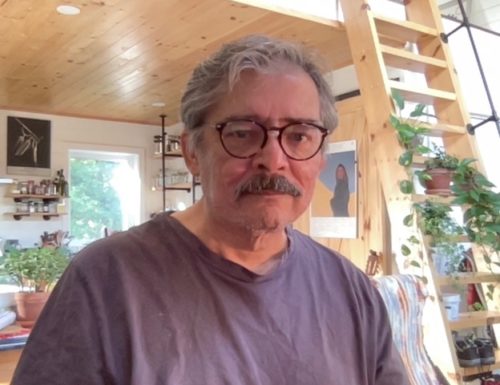“What are those?” I ask, pointing to a large, bright white slab adorned with plants and flowers. The slab is a little more than two meters long, half as wide, and about a half a meter in height. It sits in front of a Samoan fale, a traditional oval-shaped home on stilts. I’ve seen a lot of these memorials on our ride to the Robert Louis Stevenson Mansion, then still the official residence of the O le Ao o le Malo.
“That’s a burial place,” Father Seluini explains. “Traditional families honour a family member who’s passed away.”
Seluini, a Catholic priest, says traditions like this are dying out. People live longer these days and there’s a growing population putting a premium on land for new homes. People buying older properties don’t want these permanent family monuments, and more people now choose to be buried in cemeteries.
“Maybe in a few years,” Seluini continues, “there won’t be any traditional fale left and these old burial practices will disappear.”
Shame, I think, looking out the window. As a traditional Mohawk, I can’t wait to tell my parents everything as soon as I’m home again. So many things, so familiar, and I feel at home here in Polynesia.

These memories bounce around my skull decades later as I sit in a Montréal emergency room. Multiple doctors enter, grill me with the same questions over and over. Yes, I had an operation a few months ago for colon cancer. Yes, the operation went well. Apparently. At least, that’s what the surgeon said. No, I never had a follow-up or radiation.
I had gone in bent over with abdominal pain and clearly jaundiced. The diagnosis for this pain, in the second year of Covid, after several tries to get any doctor to examine me, is a gall stone. But the emergency doctor is concerned enough at the lack of follow-up after my colon operation to call in others. They decide that the cancer has moved from my colon to the liver.
“Metastasized” is the word the doctors use over the next couple of weeks. Later, after a biopsy and a CT scan, I hear the words “inoperable” and “incurable.”
A neighbour from down the road sees me crossing the grocery store parking lot to my car.
“I haven’t seen you in a while,” he says. “How’re ya doing?”
Except he’s not really looking at me. He doesn’t bother to look up from putting groceries into the back of his car. He avoids looking directly at me. I get the impression he doesn’t really want to get into a conversation.
I know what comes next because in one way or another, this scene plays itself out right on cue every time. He’ll want me — expect me — to reply: “Fine.”
I get asked how I’m doing whenever I go out, but there’s a different tone these days. I’m expected to reply in the same predictable way each and every time, too. Fine, they want to hear me say. I’m fine. Doing really good.
It’s almost Pavlovian. Ring that bell and get that answer.
Except I’m tired of the routine, the meaningless ritual, meant to ease their worry regardless how I might really feel. I’ve got cancer. I’ve had life-threatening scares before. This time, though, doctors used words that lock out hope. Prepare myself, they say. Wrap things up while there’s still time.
I never intended to keep my cancer a secret. I just didn’t tell anybody except close family. I knew it was never going to stay there. I didn’t realize, though, just how far and how fast news about my impending demise would travel. It’s a small village and I should’ve expected that my “best before date” would become common knowledge. Small villages, eh, where gossip is nothing more than unconfirmed news.
What I didn’t expect, though I should have, is the way people look me, at people like me with a terminal illness. Unspoken words hang in the air, words like “poor bastard” and “any time now” are tacked onto that routine greeting. In my head, it sounds more like this: “How are ya doin’, ya poor bastard?”
Nobody tries to confirm anything. Nobody asks about the things I’d want to know if I were them. They never ask if I’ve got or decided on a specific date to check out. What am I going to do with all my stuff? My house? The car? My furniture, books and pictures? Am I’m planning a “going away” party? They might want to know but they never ask when I’m standing in front of them. They’re too scared or polite to come right out and ask.
Related Posts
Why are they so afraid? Maybe it’s because I’m the reminder of everyone’s death without the shroud and scythe. I make them uncomfortable because I’m a walking, talking future staring them in the face. They fear me like an infectious disease that they can catch just by breathing the same air.
The closest comparison I can think of is when folks walking down the street come across a homeless dude sitting or asleep on the sidewalk. That kind of poverty and despair isn’t infectious but most people won’t even look in that person’s direction much less look that person right in the eye. They step around that poor slob preferring to talk into a pretend phone or stare at the bus stop sign as if their lives depend on it.
I wish you’d stop pretending. I wish you would dispense with these little rituals that create distance, distance and separation, that set me over there with other discarded items waiting to be forgotten. Just say hello. All I want is a little honesty.
Tell me you noticed how much weight I’ve lost. Tell me how well my clothes hang on my bones. Mention how good I look all thin and everything. Tell me something real and let’s joke about it. Don’t stare at someplace off my shoulder, avoid my eyes, like there’s a great big lump growing out of my forehead. Of course, you may not mean to, but that’s how you make me feel.
I think I only started to think about these things when I was first diagnosed with cancer. At first, I was numb. That word hit me like a truck. Just like that, all my dreams and plans were cancelled or put on hold indefinitely. Even simple things like bicycle rides and going to a movie fell to the whims of people in lab coats, replaced by blood tests and CT scans, chemo and radiation. Of course, who has the energy to do anything after all that shit?
In the beginning, I walked into the cancer clinic for orientation. Yeah, they have a day like that for newbies. I sat in a room while well-meaning lab coats rattled on about diet, exercise and weight. Mostly it was about what you couldn’t eat and shouldn’t do. Even in that small room, we lucky bunch didn’t dare look at one another in case we jinxed ourselves. The room smelled of fear and denial.
On the way out, we tried to scuttle our separate ways as quickly as possible. I slowed to check my watch but felt a slight tug on my arm. A tiny older woman that I’d noticed on the far side of the room asked in a tiny, timid voice, “Are you afraid?”
There’s an unspoken code among cancer patients. Don’t talk to one another.
I remembering being confused by her question. Of course, I was afraid. I was scared shitless. It’s not easy to be told that the end of your life just poked its ugly head into your business. All I wanted was to get away from there, to pull away from that whole scene. But I couldn’t move away from her for some reason.
I looked down at her face from my full height and into eyes that I can still see. I lied in as calm a voice as possible, “No. I’m not scared. What they told us is scary but I’m not afraid. Are you?”
“Yes,” she said. That’s all.
Not knowing what else to do, I asked if she had someone with her that day. A few of the other newbies had friends or relatives with them for support. No, she said, she had no one.
“Why aren’t you afraid?” she asked.
Good question.
“I guess because I choose not to be afraid,” again with another lie. “I’m going to take this one step at a time. I’m going to try to not become helpless. Cancer and all these doctors take control of my life. I’m going to try to take back as much as I can. Right now, that’s all I can do.”
She looked away. I don’t think she believed me. It didn’t matter. I told her to take care of herself as she started toward the exit. I never saw her again.
There’s an unspoken code among cancer patients. Don’t talk to one another. You walk into the clinic, take your seat along with half a dozen or more other patients waiting for treatment, and no one says anything except to a support person. I don’t know why that is.
You can understand why other patients are locked into their own thoughts. You accept their solitude. What’s more difficult to understand but must respect is a wall that surrounds the kids. You want to say something, do something that’ll make them forget where they are and what’s happening but the wall is thick and shouldn’t be breached. You know this somehow and respect it.
I try to drive myself in to my daily radiation treatments but it’s tough on my body and my spirit. The early rises, the morning traffic jams, the long drive home and the always and everywhere road construction that turns a forty-minute drive into two hours. After two months of this, the body aches to surrender and the spirit wavers.
How are ya doin’?
I may be dying but I’m still here. I haven’t pulled the pin yet. I don’t want, expect or need pity. I don’t want to be avoided like I’m contagious. All I want is a little honesty.
It’d be easier if I just replied, “My cat died.” They don’t need to know if I really had a cat. I could just mention a dead pet and I guarantee they’d stop whatever, get such a look of concern on their kissers. Best of all, they’d start wanting some serious answers for a change.
That’s the thing about death, especially recently demised pets for some reason. It’s assumed that you’ve had a closer relationship with that furry little beast than you probably had with your dear Aunt Petunia, may she rest in peace. She was a relative but smelled funny and you didn’t really know her all that well anyway. On the other hand, that little animal probably listened to your inner thoughts, tolerated all of your dumb jokes, kept your feet warm every night curled up at the foot of the bed. Now that’s a real relationship.
This got me searching for answers about death and how we deal with it. Why do some people put rocks on the headstones of loved ones? Why do some societies bury family in the backyard instead of a cemetery? Why is cremation required as soon as possible after death in some cultures while another society might demand ten days of ceremony before burial?
I think about this because it’s not some vague issue to me. I need to chew on these subjects, given my own impending departure date. I don’t have a lot of time left for “on the one hand… on the other hand” bullshit. I need clarity. I need to make decisions.
When Mom died, a few years before Dad, she decided to be buried on the family property. I can’t say for certain that my memories of Samoa were inspiration. Our parents talked to us about their burial plans but they weren’t looking for permission or advice. They’d long before decided where they wanted to be planted, how their bodies would be treated after death, and even how their heads should point east and their feet to the west. It was all very mature, reasoned and respectful to our cultural and spiritual beliefs.

They wanted a traditional, meaning as natural as possible, burial. They understood the need for a coroner to certify the cause of death but insisted there be no embalming, no makeup, no expensive coffin, no funeral home. Someone would make a pine box. They’d wear everyday clothes, be wrapped in their favourite blankets, come home to family for ten days of ceremonies to “release the spirit.” As plain and as simple as that.
Except nothing is ever plain or simple with death. Told about this plan, the authorities tried to intervene, but Dad told them to get stuffed. Dad had to rescue Mom from the funeral parlour before the funeral director filled her with embalming fluid and slathered thick makeup on her. He arranged for women back home to “wash her,” in the customary way. That was just the beginning.
A neighbour who was also a band councillor heard about Mom’s burial plans. He confronted my father, telling him that Mom’s traditional Mohawk burial plan was nothing but voodoo. He said he wouldn’t allow it.
What are you gonna do, Dad asked? There’s nothing illegal. Nobody’s breaking any rules because there aren’t any. Not here. Not about this. These are our customs and our traditions.
That councillor said that if Dad went ahead with Mom’s burial, he’d have to dig her up and re-bury her in the christian cemetery. That it was a christian cemetery was one of the reasons Mom refused to be buried there in the first place. Besides, it was so crowded already, bodies stacked on top of one another. This was because for a century and more, people from the Rez weren’t allowed to be buried in the white cemetery down in the village. Nope, Mom wasn’t having any of that.
This isn’t unique to Mohawk culture. A lot of cultures around the world hold similar beliefs. Ceremonies like this allow a period of mourning, but then it should end. Our period of mourning takes place over ten days with daily rituals meant to ease the pain and grief of the living while encouraging the remaining spirit to let go and begin its separate journey.
This doesn’t mean we stop remembering. Quite the opposite. But there’s a time to let go of the pain and sadness because life must go on. After a year, another ceremony and feast take place with an extra plate set aside for the spirit of the deceased. This signals a final step in grieving.
What are my own plans? Just because it’s a traditional way of conducting a funeral doesn’t mean I can’t bring some new twists. I mean, why can’t I have a “going away” party, just one day like they do in New Orleans where a jazz band (or any bunch with musical instruments) bops on down the boulevard making a lively racket on the way to the cemetery?
Why the hell not?
It’s my party and I’ll do what I want.

To see what Dan David is up to connect with him:
- shmohawk.wordpress.com
- Threads (@shmohawk_ca)







